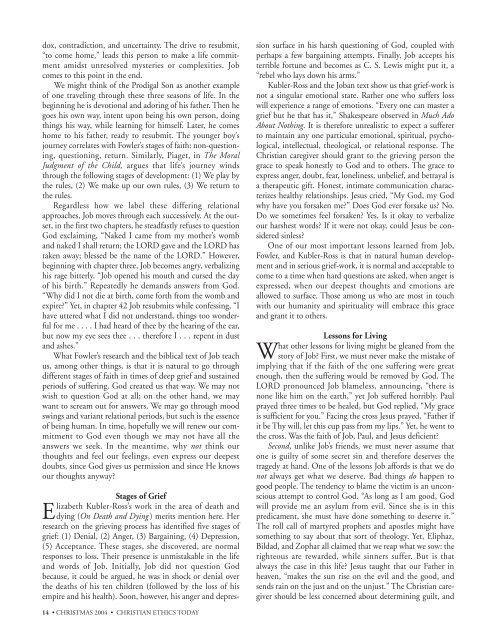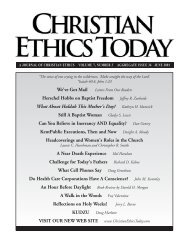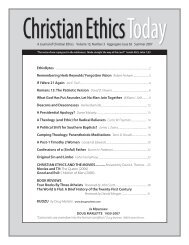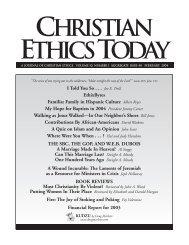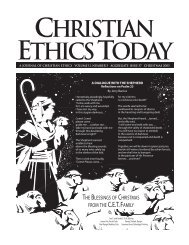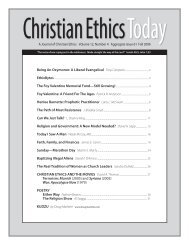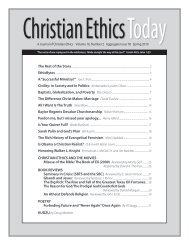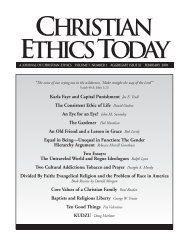Issue 052 PDF Version - Christian Ethics Today
Issue 052 PDF Version - Christian Ethics Today
Issue 052 PDF Version - Christian Ethics Today
Create successful ePaper yourself
Turn your PDF publications into a flip-book with our unique Google optimized e-Paper software.
dox, contradiction, and uncertainty. The drive to resubmit,<br />
“to come home,” leads this person to make a life commitment<br />
amidst unresolved mysteries or complexities. Job<br />
comes to this point in the end.<br />
We might think of the Prodigal Son as another example<br />
of one traveling through these three seasons of life. In the<br />
beginning he is devotional and adoring of his father. Then he<br />
goes his own way, intent upon being his own person, doing<br />
things his way, while learning for himself. Later, he comes<br />
home to his father, ready to resubmit. The younger boy’s<br />
journey correlates with Fowler’s stages of faith: non-questioning,<br />
questioning, return. Similarly, Piaget, in The Moral<br />
Judgment of the Child, argues that life’s journey winds<br />
through the following stages of development: (1) We play by<br />
the rules, (2) We make up our own rules, (3) We return to<br />
the rules.<br />
Regardless how we label these differing relational<br />
approaches, Job moves through each successively. At the outset,<br />
in the first two chapters, he steadfastly refuses to question<br />
God exclaiming, “Naked I came from my mother’s womb<br />
and naked I shall return; the LORD gave and the LORD has<br />
taken away; blessed be the name of the LORD.” However,<br />
beginning with chapter three, Job becomes angry, verbalizing<br />
his rage bitterly. “Job opened his mouth and cursed the day<br />
of his birth.” Repeatedly he demands answers from God.<br />
“Why did I not die at birth, come forth from the womb and<br />
expire?” Yet, in chapter 42 Job resubmits while confessing, “I<br />
have uttered what I did not understand, things too wonderful<br />
for me . . . . I had heard of thee by the hearing of the ear,<br />
but now my eye sees thee . . . therefore I . . . repent in dust<br />
and ashes.”<br />
What Fowler’s research and the biblical text of Job teach<br />
us, among other things, is that it is natural to go through<br />
different stages of faith in times of deep grief and sustained<br />
periods of suffering. God created us that way. We may not<br />
wish to question God at all; on the other hand, we may<br />
want to scream out for answers. We may go through mood<br />
swings and variant relational periods, but such is the essence<br />
of being human. In time, hopefully we will renew our commitment<br />
to God even though we may not have all the<br />
answers we seek. In the meantime, why not think our<br />
thoughts and feel our feelings, even express our deepest<br />
doubts, since God gives us permission and since He knows<br />
our thoughts anyway?<br />
Stages of Grief<br />
Elizabeth Kubler-Ross’s work in the area of death and<br />
dying (On Death and Dying ) merits mention here. Her<br />
research on the grieving process has identified five stages of<br />
grief: (1) Denial, (2) Anger, (3) Bargaining, (4) Depression,<br />
(5) Acceptance. These stages, she discovered, are normal<br />
responses to loss. Their presence is unmistakable in the life<br />
and words of Job. Initially, Job did not question God<br />
because, it could be argued, he was in shock or denial over<br />
the deaths of his ten children (followed by the loss of his<br />
empire and his health). Soon, however, his anger and depres-<br />
14 • CHRISTMAS 2004 • CHRISTIAN ETHICS TODAY<br />
sion surface in his harsh questioning of God, coupled with<br />
perhaps a few bargaining attempts. Finally, Job accepts his<br />
terrible fortune and becomes as C. S. Lewis might put it, a<br />
“rebel who lays down his arms.”<br />
Kubler-Ross and the Joban text show us that grief-work is<br />
not a singular emotional state. Rather one who suffers loss<br />
will experience a range of emotions. “Every one can master a<br />
grief but he that has it,” Shakespeare observed in Much Ado<br />
About Nothing. It is therefore unrealistic to expect a sufferer<br />
to maintain any one particular emotional, spiritual, psychological,<br />
intellectual, theological, or relational response. The<br />
<strong>Christian</strong> caregiver should grant to the grieving person the<br />
grace to speak honestly to God and to others. The grace to<br />
express anger, doubt, fear, loneliness, unbelief, and betrayal is<br />
a therapeutic gift. Honest, intimate communication characterizes<br />
healthy relationships. Jesus cried, “My God, my God<br />
why have you forsaken me?” Does God ever forsake us? No.<br />
Do we sometimes feel forsaken? Yes. Is it okay to verbalize<br />
our harshest words? If it were not okay, could Jesus be considered<br />
sinless?<br />
One of our most important lessons learned from Job,<br />
Fowler, and Kubler-Ross is that in natural human development<br />
and in serious grief-work, it is normal and acceptable to<br />
come to a time when hard questions are asked, when anger is<br />
expressed, when our deepest thoughts and emotions are<br />
allowed to surface. Those among us who are most in touch<br />
with our humanity and spirituality will embrace this grace<br />
and grant it to others.<br />
Lessons for Living<br />
What other lessons for living might be gleaned from the<br />
story of Job? First, we must never make the mistake of<br />
implying that if the faith of the one suffering were great<br />
enough, then the suffering would be removed by God. The<br />
LORD pronounced Job blameless, announcing, “there is<br />
none like him on the earth,” yet Job suffered horribly. Paul<br />
prayed three times to be healed, but God replied, “My grace<br />
is sufficient for you.” Facing the cross Jesus prayed, “Father if<br />
it be Thy will, let this cup pass from my lips.” Yet, he went to<br />
the cross. Was the faith of Job, Paul, and Jesus deficient?<br />
Second, unlike Job’s friends, we must never assume that<br />
one is guilty of some secret sin and therefore deserves the<br />
tragedy at hand. One of the lessons Job affords is that we do<br />
not always get what we deserve. Bad things do happen to<br />
good people. The tendency to blame the victim is an unconscious<br />
attempt to control God. “As long as I am good, God<br />
will provide me an asylum from evil. Since she is in this<br />
predicament, she must have done something to deserve it.”<br />
The roll call of martyred prophets and apostles might have<br />
something to say about that sort of theology. Yet, Eliphaz,<br />
Bildad, and Zophar all claimed that we reap what we sow: the<br />
righteous are rewarded, while sinners suffer. But is that<br />
always the case in this life? Jesus taught that our Father in<br />
heaven, “makes the sun rise on the evil and the good, and<br />
sends rain on the just and on the unjust.” The <strong>Christian</strong> caregiver<br />
should be less concerned about determining guilt, and


